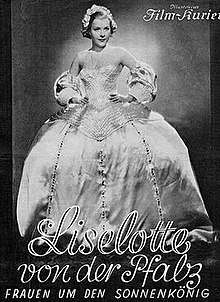The Private Life of Louis XIV
The Private Life of Louis XIV or Liselotte of the Palatinate (German: Liselotte von der Pfalz) is a 1935 German historical film directed by Carl Froelich and starring Renate Müller, Eugen Klöpfer and Maria Krahn.[1] The film's English language release title is a reference to the hit British film The Private Life of Henry VIII (1933).
| The Private Life of Louis XIV | |
|---|---|
 | |
| Directed by | Carl Froelich |
| Produced by | Carl Froelich |
| Written by | Karl Peter Gillmann Wolfgang Hoffmann-Harnisch Carl Froelich |
| Starring | Renate Müller Eugen Klöpfer Maria Krahn Maly Delschaft |
| Music by | Alois Melichar |
| Cinematography | Reimar Kuntze |
Production company | Carl Froelich-Film |
| Distributed by | Tobis Film |
Release date | 8 August 1935 |
| Country | Nazi Germany |
| Language | German |
The film portrays the life of the Heidelberg-born Elizabeth Charlotte, Princess Palatine, who married into the French royal family during the reign of Louis XIV. She was also the subject of a 1966 biopic in which she was played by Heidelinde Weis.
Cast
- Renate Müller as Liselotte von der Pfalz
- Eugen Klöpfer as Prince Karl Ludwig
- Maria Krahn as The Princess
- Maly Delschaft as Luise von Degenfeld
- Edith Oß as Anneliese von Degenfeld
- Ida Wüst as Countess Sophie von Hannover
- Renate Howe as Princess Charlotte
- Maria Seidler as Mrs. von Uffeln
- Eduard Bornträger as Haushofmeister des Kurfürsten
- Michael Bohnen as King Louis XIV of France
- Hans Stüwe as Philipp Of Orleans
- Else Ehser as Queen Maria Therease
- Petra Unkel as The Dauphin
- Dorothea Wieck as Madame de Maintenon
- Lothar Körner as Marquis Louvois
- Alexander Golling as General Mélac
- Hans Adalbert Schlettow as the commander of French troops in Heidelberg
- Aribert Wäscher as Chevalier de la Lorraine
- Heinz von Cleve as Roland de Saint Cour
- Maria Reisenhofer as The Abbess of Maubuisson
- Valy Arnheim
- Hilde Hildebrand as Duchesse de Montespan
- Franz Klebusch
- Fritz Lafontaine
- Maria Meissner as Marquise de la Valliere
- Anneliese Würtz
gollark: "Objective" morality is ridiculous, how would some moral system be *objectively correct*?
gollark: ... what?
gollark: I mean, it's a contrived scenario.
gollark: Well, yes, probably.
gollark: There's an important question here though: What is the *point* of punishing people?
References
- Hake p.145
Bibliography
- Hake, Sabine. Popular Cinema of the Third Reich. University of Texas Press, 2001.
External links
This article is issued from Wikipedia. The text is licensed under Creative Commons - Attribution - Sharealike. Additional terms may apply for the media files.